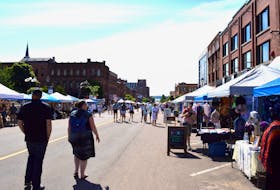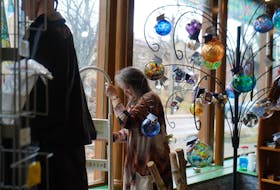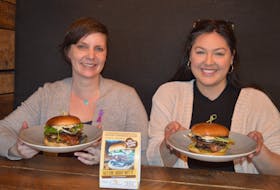COVID-19 is one of the moments that will mark time in our history.
Much like 9/11, these types of events shatter how we see the world and what we believe to be normal and predictable. But they also have a way of accelerating the inevitable, like the adoption of innovative ideas, says Sheri Somerville.
Somerville is the chief executive officer for the Atlantic Chamber of Commerce. She says the impact COVID-19 had on business was one of the first ways our world changed, but she hopes the lessons learned will help put businesses on a path to a better future.
“Until we have a vaccine and things are more predictable, we will continue to see unpredictability in consumer confidence,” says Somerville.
And this means there will be unstable purchase patterns that will directly affect businesses, she says.
“We’re already seeing this in tourism in N.B. and P.E.I. as they move to ease restrictions. Until we know who will be able to travel in Atlantic Canada, how can business owners plan how many to hire and how many goods to put on their shelves?”
It’s an unfortunate reality that not all businesses that existed prior to the closure of economies in Atlantic Canada as COVID-19 began impacting the region last March will survive. But, Somerville says, businesses have faced disruption in the past and she expects to also see new businesses starting up.
Her reasoning? One need only look at how fast some companies adapted, she says, pointing out that innovation is a critical component of business operations.
“Business will be conducted like it has for centuries, we may just find ourselves doing it in new and interesting ways, much like the cell phone and computer have changed the way we have worked over the last 20 years,” says Somerville.

Medical impact
Our worldwide medical view has also changed because of COVID-19.
“One of the big realizations from the COVID-19 pandemic is how intertwined human health is with animal health,” says Dr. Natalie Bridger, clinical chief of Infection Prevention and Control at Eastern Health and an associate professor of pediatrics at Memorial University of Newfoundland.
Bridger says many people in the infectious disease world have been concerned about this for years, with both the emergence of novel viruses and antimicrobial resistance.
One thing COVID-19 has shown, says Bridger, is that global health is a real concept. As much as we try to compartmentalize major health events like this, what happens in other regions of the world affects us and vice versa, she says.
Bridger says the medical world can learn from the present situation even if the infectious agents change between pandemics because some of the principles remain the same. It’s similar to how local policies were revised based on lessons from the SARS pandemic of 2002-2003, she says.
“One great thing about the high level of connectedness right now is that we are able to look to other jurisdictions to see strategies that work more quickly than ever before. Ultimately, the transparent sharing of experiences, good and bad, will be the key to enhancing future preparedness,” says Bridger.
Bridger hopes this pandemic will force us to be more considerate of our actions and how they impact others. She also suspects there may be continued apprehension about attending large events for the foreseeable future.
“I hope that fastidious hand hygiene will continue forever, and I am interested to see if mask-wearing in public becomes a cultural norm in Canada, and if our traditional greetings like handshakes and hugs are modified,” says Bridger.
Environmental impact
It’s not hard to see that COVID-19 has affected our view on the environment and climate change. Animals are returning to cities, water pollution is clearing up, and reduced air pollution is making previously covered cities more visible from space, says Emily Kennedy, climate change coordinator for the Municipality of the County of Kings in Nova Scotia. And it’s all because we aren’t travelling as much by air or road these days, she says.
“People are also returning to the outdoors, which is one of the challenges of climate change action – our disconnect with nature,” says Kennedy.
To help us from slipping back into our old ways, Kennedy hopes people will be more conscious of their choices and do what they can for the environment.
“Some in-home climate actions include reducing food waste and being more conscious of our purchasing power, or by putting gardens on our properties to produce food, but also sequester carbon,” says Kennedy.
“There has never been an easier moment to begin implementing climate-forward action than now as globally, we are seeing cooperation between countries like never before. This is the perfect case study for working towards a solution of such magnitude at a global level, that will have wider impacts for a greater number of people.”
Societal impact
Kevin MacKenzie, who recently retired from a 25-year career as a minister at the Park Royal United Church in Charlottetown, P.E.I., says COVID-19 has demonstrated how much society takes for granted.
“I have realized how fortunate I have been to live in an open and privileged society where I gave little thought to simply going to the store when I wanted to; participating in church services and Rotary meetings; visiting with my father and friends whenever the whim struck me; walking down the sidewalk where greeting people was considered a common and safe activity,” says MacKenzie.
“When things return to ‘normal,’ I think I will be more aware of the gift of a friendly and safe community, where being together with family and friends, and even with strangers in the store or at community gatherings is more than just something to be taken for granted, but rather treated as a gift to be cherished.”
To make sure this happens, he says people need to continue doing their best to help others. If a phone call helped amid a pandemic, it would also help in ordinary times.
“We need to ask, ‘What have I missed the most in this time?’ or ‘What have I appreciated the most?’ Be it time with loved ones, time for reading, time to work in the yard, etc., and resolve to continue making time for such activities in the future, not allowing the busyness, which we may have discovered is not as necessary as we thought, to crowd out that which we enjoy,” says MacKenzie.









